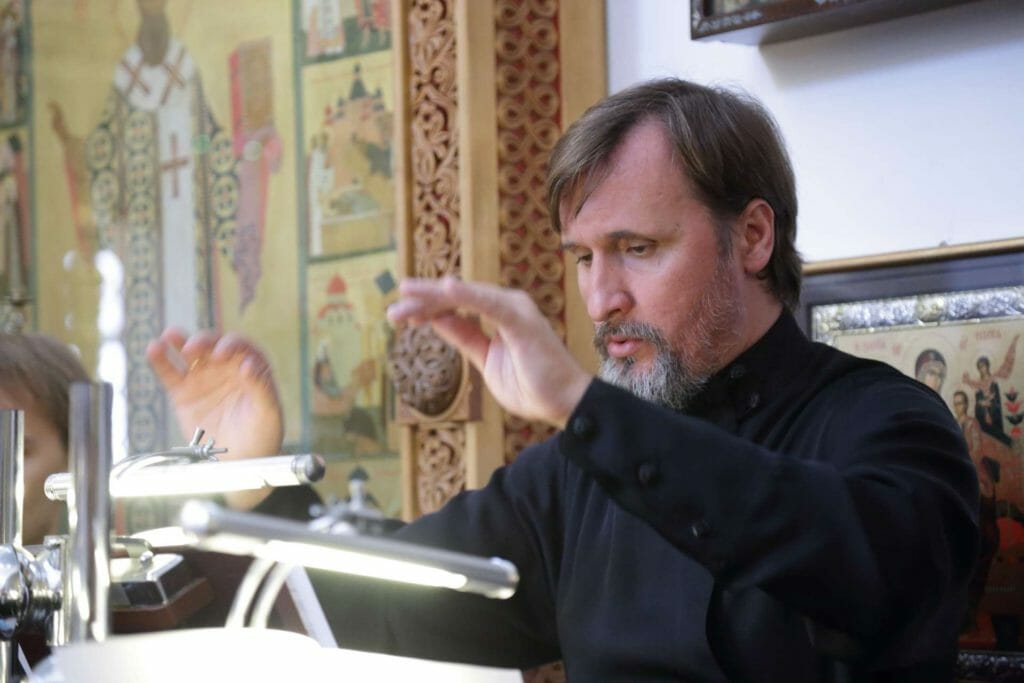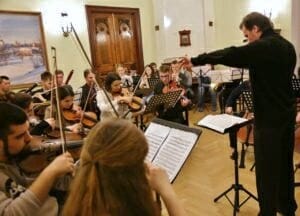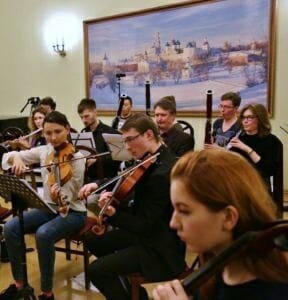Similar Posts
Maestro Vladimir Gorbik, renowned choral director of the Moscow Representation Church of the Holy Trinity-St Sergius Lavra, has founded a new symphony orchestra. Maestro Gorbik, having accomplished so much as a liturgical musician in Russia, and having co-founded PaTRAM in order to share his skills with Orthodox Americans, now wishes to offer his Orthodox musical aesthetic in the field of classical symphonic music.
I asked Vladimir Gorbik a few questions to learn more about this interesting project:
Gould: How can Orthodox liturgical music inform the proper interpretation and performance of classical music?
Gorbik: Unfortunately, there are many conductors in the world who are very far from common sense. Not only are they not Orthodox believers – they are not believers in God at all. They perform crazy modern music, and most people are not interested in such music. They do strange interpretations of classical music too, which are not interesting for many people. My spiritual father, Metropolitan Longin from Saratov, said to me: Vladimir, if a conductor is a believer in God then God helps him to unite musical form with content.
So we understand that liturgical music helps form in man a mind and a soul – it helps to create his or her personhood. With this maturity, such a conductor (if he is a professional conductor, of course) can perform any music, basically according to his common sense.
Gould: What do you feel is wrong with modern orchestras and their repertoire?
Gorbik: I have begun to answer your question already, but I can add to that. For example, many people go to concerts and are overwhelmed with this crazy way of playing and strange repertoire, right? We see that not only in music – we see it in other arts. Unfortunately, modern music, pictures, architecture – they appear insane in the face of common sense. There is no harmony in these modern arts for people who have harmony in their hearts.
We also see that sane people, people who have common sense, are not interested to listen to such composers, to read such writers, to watch these sculptors and architects, who are too far from God and from common sense.
According to professional ethics, I cannot tell you names of these orchestras, conductors or composers, but everyone knows there are many such conductors and composers in the world.
Gould: What will your orchestra do differently?
Gorbik: I like a traditional interpretation of classical music and the art of conducting exhibited by the great conductors of the past.
By the same principle, we Orthodox love to read the writings of canonical saints, and to generally live by the proven ways of our faith, not by the way of our passions.
I don’t like to perform music in a modern or innovative way only in order to become famous in the world. I don’t like this way.
Gould: How do you think the public, and academia, will respond to this?
Gorbik: I am sure they will certainly love it, because they love beauty and harmony. There are many believers in God among such people.
For more specifics about Maestro Gorbik’s new orchestra and his partnerships with the Moscow Conservatory and PaTRAM, see this article by Seraphim Hanisch.




Mr. Gorbik is doing so much for Orthodoxy and Orthodox music! He clearly believes in making an impact on the public and academia and, no doubt, will leave a strong impression on anyone who reads this very provacative interview. The world needs to hear what “true” music is and who should make it, especially from a musician of Mr. Gorbik’s caliber.
Mr. Hanisch, is an exceptional writer, and it is my hope that he will continue to advocate for “truth” and “true greatness” as often as possible.